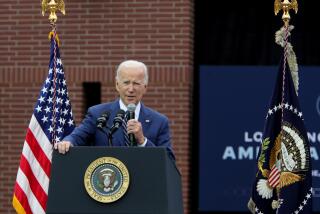Bush Drug Plan Could Speed Sale of Generics
- Share via
WASHINGTON — The Bush administration plans to shorten the period of time that patents can protect exclusive marketing of brand-name drugs in an effort to get generic prescription medicines on the market more quickly, a senior administration official said Sunday night.
The regulations being proposed by the administration will restrict the opportunities for major drug companies to seek patent extensions based on minor changes to packaging or changes that occur to drugs once they are ingested.
The administration expects the plan will save consumers, the federal and state governments -- particularly the Medicare and Medicaid programs -- and insurers at least $3 billion a year by speeding up the use of generic drugs, which generally cost less than brand-name drugs.
President Bush plans to announce the proposed regulations this morning at a White House ceremony, said the official, speaking on condition of anonymity. They would take effect shortly after a 60-day comment period, during which major drug manufacturers are expected to file strenuous objections.
“We think we are on quite solid legal grounds,” the administration official said.
The measure would not require approval by Congress.
By announcing the plan immediately after members of Congress have left Washington for the final two weeks of intense campaigning before the midterm elections, the White House likely has avoided turning the plan into a central debating point between the Democratic-led Senate and the Republican administration.
Congressional efforts to create a prescription drug benefit under Medicare collapsed over the summer, despite intense lobbying by the AARP and other senior citizen groups. The Senate pushed ahead with a proposal to ease access to generic drugs, but Congress has not completed work on the plan.
The Generic Pharmaceuticals Assn., an organization that represents the manufacturers of generic drugs, hailed the administration’s proposal Sunday.
“We are very supportive,” said Kathleen Jaeger, the president and CEO of the Washington-based organization.
The White House is presenting the plan as part of its response to complaints that Medicare does too little to help the elderly pay the dramatically increasing costs of prescription drugs.
Under current regulations, when major drug manufacturers’ patents expire, they frequently can block production of generic drugs by other companies by filing for new patents based on changes in packaging and minor chemical changes in the product.
Under the administration’s proposal, the companies would be given a 30-month period beyond the current patent for exclusive production of the drug. But they would not be allowed to file for repeated patent extensions.
A recently completed administration study of patent extensions during the period from 1992 to 2000 found at least seven cases in which major brand-name drugs were given multiple patent extensions, blocking the production and sale of identical, but much cheaper, generic drugs.
“This action is a direct, immediate and rapid response” to that study, the senior administration official said.
The official said that the Food and Drug Administration had found that generic drugs, while essentially the same chemically, were sold for roughly one-third the cost of the brand-name product.
The announcement, disclosed in a conference call to reporters, follows a recommendation by the Federal Trade Commission that patent-holders be given one automatic 30-month stay to allow them time to mount legal challenges to applications for generic production of a drug.
The period of 30 months was chosen, the official said, because that was the typical amount of time required for litigation to work its way through the federal district courts in such patent cases.
More to Read
Get the L.A. Times Politics newsletter
Deeply reported insights into legislation, politics and policy from Sacramento, Washington and beyond. In your inbox twice per week.
You may occasionally receive promotional content from the Los Angeles Times.










